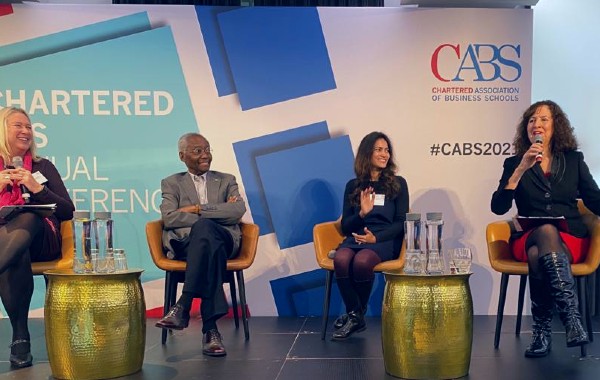
Photo: Professor Wendy Loretto, Sir Geoff Palmer, Rita Kakati-Shah, Jane Cordell
Reducing inequality and boosting inclusion was the timely theme for this year’s conference of senior leaders of the UK’s Higher Education business schools with the Chartered Association of Business Schools (ABS). Jane was invited to join a keynote panel and describes the experience here.
The sun glinted off the roof of the Shard and St Paul’s as I walked over Waterloo Bridge for the first time in what felt like a century, but in reality, was 2 years. The occasion felt momentous for more than one reason: the first trip to London since the pandemic, the first large-scale ‘live’ speaking event and the first time I had addressed such a large group of very senior leaders.
I felt very fortunate to be joining a panel chaired by Professor Wendy Loretto, Dean of Edinburgh University Business School with Sir Geoff Palmer, Chancellor and Professor Emeritus of Heriot-Watt University, Sandra Kerr, Race Director at Business in the Community and Rita Kakati-Shah, CEO of Uma – an organisation aiming to bring talented women back into the workforce.
We each spoke about tackling inequality, bringing a mixture of personal and professional experience to our contributions, including striking (and depressing) statistics about ongoing levels of bullying and harassment of black employees from Sandra Kerr, Sir Geoff’s vivid accounts of how racism and low expectations influenced him in his early career and Rita’s descriptions of being ostracized in London as the ‘only brown face’ at her primary school and being inspired to develop the tool of empathy to encourage people to overcome prejudices and fears.
In my own slot, I reminded the audience of the power they have, including the power to question the status quo: ‘Just ask the question “Why are things the way they are?”’ – as Naomi Obeng, a playwright, recently said. I gave examples of how people who become disabled and manage disabilities are good at both innovation and resilience - key qualities in entrepreneurship. I then asked delegates to reflect on their own experience using a mini privilege exercise designed to get them thinking about the resources (time and energy) they expend normally on:
- doing what they do best
- handling barriers linked to their differences
- enabling other people to feel comfortable around them.
This generated some discussion! I reported that most of the hundreds of disabled professionals with whom we have worked say that far too much time and energy has to go on the second and third things above.
How well-represented are disabled people in higher education and business? Data is not readily available, but I set the context with a few statistics:
- 2013–19 an average of 11% of degree students had a ‘known’ disability or less than half the representative figure for working-age people. HESA the (Higher Education Statistics Agency) estimates that this figure is rising, particularly due to mental health conditions.
- In the FTSE 100 only 3.2% of employees are known to be disabled (a sixth of the representative figure).
- Among senior executives and directors the figure is 0% – which, I suggested, says a lot more about the stigma still attached to a disability or long-term health condition than the capacity of a C-suite job to prevent you from getting one!
- Result CIC’s programmes for Higher Education staff with disabilities and staff who experience racism see an average increase of 40% against criteria such as self-confidence and ability to use their skills.
I recommended that participants consider taking 3 actions:
- Get to know the National Association for Disabled Staff Networks (NADSN) – the hyper network of networks – recognising the golden thread between staff and students and the importance of fostering confident role models.
- Check out the Valuable 500 and its work with leading companies to de-stigmatise disability and making reporting more transparent.
- Look critically at how their organisation values the lived experience of their staff and students and channels it into answering the question ‘Why are things the way they are?’.
During the subsequent discussion, a question was asked about how to make the most of alumni (previous students), especially in mentoring current students. The panel spoke about reciprocal and reverse mentoring, where the emphasis is more on sharing and mutual learning than on guidance from the more senior mentoring partner. Result CIC is currently running two programmes to train and support such mentoring projects (see our Autumn news). Do get in touch if you are interested in this for your organisation.
Finally, a big thank you to the Chartered Association of Business Schools for such a welcoming, smoothly-run and honest event, particularly the conference supremo, Oliver Lowe. It is great to see that where equality and inclusion is concerned, its members really do mean business!